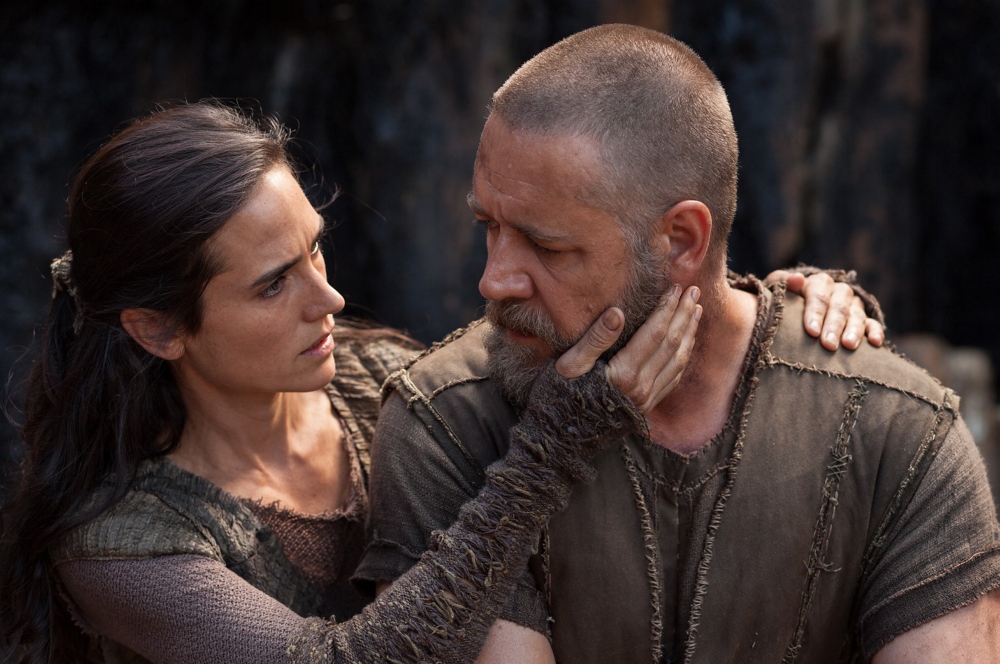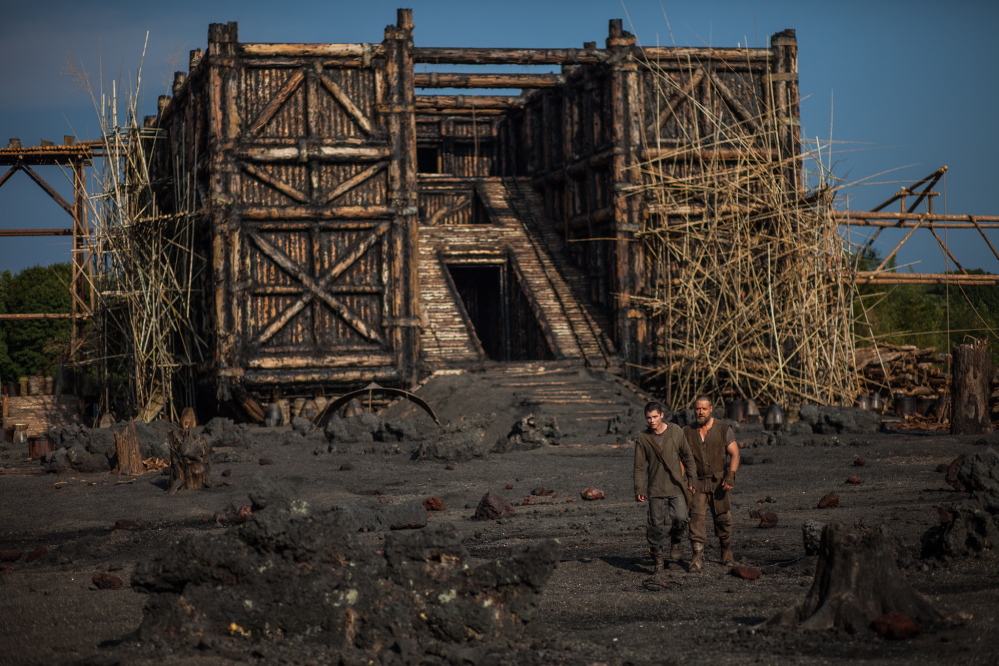MEXICO CITY — A lot of people think they know what the real story of the movie “Noah” should be.
They are likely some of the same people who think they know what the real story of the man Noah is.
Darren Aronofsky, the director of the new movie about the man and the great flood, is ready to rain on what he believes is their misinformed parade.
“Noah has been turned into a nursery school story,” said the director and co-writer of “Noah,” which had its world premiere in Mexico City earlier this month. “And it’s not a nursery school story in the Bible. It’s the end of the world.”
Rarely in recent years has a movie generated as much polarizing opinion before its release as “Noah,” a $130 million drama set to arrive in U.S. theaters on Friday. The film stars Russell Crowe as the man who builds a giant ark as God wipes a sinful mankind from the planet; Jennifer Connelly plays his wife, Naameh, with Anthony Hopkins as his grandfather, Methuselah.
The movie is the target of a fatwa from a leading Egyptian Sunni Muslim institution because Noah is mentioned in the Koran and therefore not suitable for artistic depiction. Qatar, Bahrain and the United Arab Emirates have banned the film, with other Middle Eastern countries expected to follow. Closer to home, where in theory there is more religious tolerance, “Noah” has already been attacked by the Christian right for its creative license.
Paramount Pictures, which co-financed “Noah” with New Regency and is distributing the film, believes much of the censure has come from people who haven’t seen the film and were responding to secondhand accounts of an outdated screenplay.
One conservative Christian organization, the National Religious Broadcasters, threatened to boycott the film unless Paramount put out a marketing disclaimer. Without telling Aronofsky, the studio decided to modify advertising materials by saying the movie was “inspired by” the story of Noah rather than be seen as literal scripture.
At the center of the storm stands a weary Aronofsky, whose strongly personal films include “Black Swan” and “The Wrestler” and who is a veteran of tough battles with studios and executives over the years.
The 45-year-old filmmaker has been thinking a lot about Noah ever since he wrote a prize-winning poem about the Bible story called “The Dove” when he was 13.
He and screenwriter Ari Handel have been working on the “Noah” script for a decade, burying themselves in research – “I read everything,” said Aronofsky, who can pass for an armchair religious scholar – and consulting with an array of Jewish and Christian theologians.
Now that the 2-hour-18-minute film has been screened, the result of their investigations is obvious: “Noah” is one of the most overtly spiritual movies any big Hollywood studio has made in years (both the current “Son of God” and Mel Gibson’s “The Passion of the Christ” in 2004 were independently produced).
“The creator made Adam in His image, then placed the world in his care,” is one of the very first lines of dialogue in the film.
And even if Crowe has the lead role, the real star of the movie is the concept of original sin.
Audiences seem intrigued by the premise. Two weeks ahead of the film’s domestic debut, moviegoers’ interest is strong.
SHORT STORY LONG
The forthcoming debate around the film will likely focus on how the filmmaker has expanded the Noah story into a full-length film. As Aronofsky points out, the Genesis tale of Noah, for all of its enduring power, is fleeting in the Bible, and Noah doesn’t speak until a dove returns with an olive branch. That doesn’t make for much of a movie.
“When you really look at the story in the Bible, there’s very, very little information,” Aronofsky said. “It’s four chapters long. No one speaks until the end. And the Noah character doesn’t really have an arc – with a ‘c.’ But the more you read it, the more interesting clues there are. There are many, many hints at things.”
Working in what he calls “the tradition of Jewish Midrash” (stories based on the Bible by scholars), in which he and Handel work to fill gaps in the biblical narrative, Aronofsky created a story that tries to explicate Noah’s relationship with God and God’s relationship with the world as it has become.
The film follows Scripture closely – the ark is dimensionally accurate, cubit by cubit. Close watchers of “Noah” will notice seven of the “clean” animals (as the Bible has it) entering the ship along with the pairs of other species, and Noah does end up drunk and naked, just as it is in the Old Testament.
The handful of religious critics who saw the film before its premiere have singled out several of the film’s creations for particular condemnation. Jerry Johnson, the president of the NRB, said in part he was put off by a “Noah” montage suggesting that evolution and creationism are not mutually exclusive and that Noah wasn’t “righteous” enough.
Like other early naysayers, Johnson was also bothered by the film’s suggestion that stewardship of the earth – Noah and his family are vegetarians, and the antediluvian planet (the film shot in barren landscapes in Iceland) has been ravaged by misuse – is somehow inconsistent with the Bible and is thus “phony.”
Aronofsky, who was raised Jewish and identifies himself as an atheist, aims to follow a course that makes his telling both relevant and timeless; in one rapid-fire sequence about violence, you can glimpse in the blink of an eye some modern weapons.
In terms of the film’s environmental themes, he says he was motivated to relate in “Noah” what had happened to the world so quickly after the Garden of Eden.
As for Noah’s not eating meat, Aronofsky pointed out, there’s a clear mandate in Genesis when God says, “I have given every green plant for food.”
“To go all the way from the beauty of creation to the grieving of God’s heart in 10 generations made us think there is a lot of story there,” the director said. “The pain that the creator must have felt to be contemplating destroying His creation – we wanted to personify that. So we tried to connect that story to Noah’s story, and we made Noah a personified, humanized version of God’s journey. And God’s journey in the story is from a God who wants justice to a God who grants mercy. ”
Send questions/comments to the editors.




Success. Please wait for the page to reload. If the page does not reload within 5 seconds, please refresh the page.
Enter your email and password to access comments.
Hi, to comment on stories you must . This profile is in addition to your subscription and website login.
Already have a commenting profile? .
Invalid username/password.
Please check your email to confirm and complete your registration.
Only subscribers are eligible to post comments. Please subscribe or login first for digital access. Here’s why.
Use the form below to reset your password. When you've submitted your account email, we will send an email with a reset code.